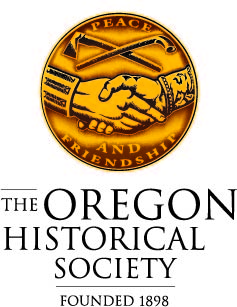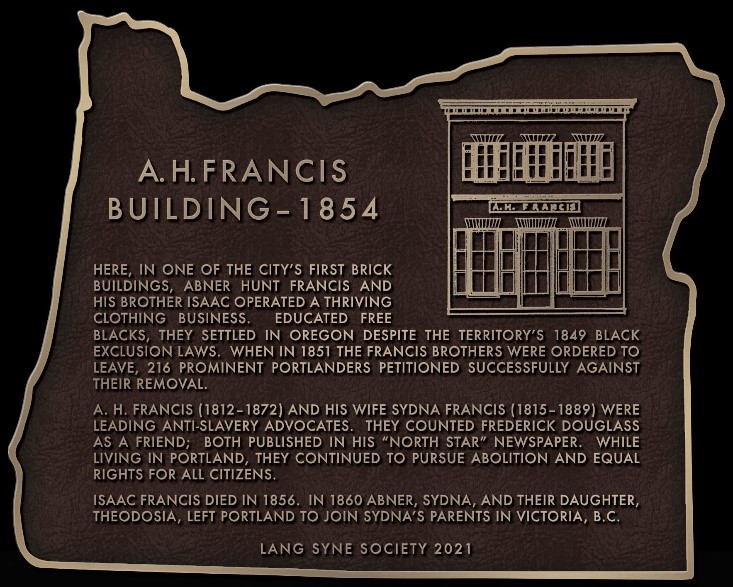New Plaque Honors Black Pioneer Merchant A.H. Francis; Public Dedication On Saturday, September 18 At 4pm In SW Portland (Photo) - 09/15/21
Portland, OR — On Saturday, September 18, the Lang Syne Society and Oregon Black Pioneers (OBP) will dedicate a plaque honoring Black pioneer merchant and abolitionist A.H. Francis. The public dedication ceremony will begin at 4pm at the site of Francis’s mercantile at SW Front Avenue & Stark Street (now SW Naito Pkwy & Harvey Milk Street). Francis’s store was located in one of the first brick buildings constructed in Portland. Today, the Morrison Bridge off-ramp curves through the site, and the plaque will be affixed to a concrete guardrail stanchion.
Abner Hunt Francis moved west in 1851, soon after Portland was incorporated, with his brother, Isaac B. Francis. Although they were threatened with expulsion from the Oregon Territory due to the Black exclusion laws, a petition signed by 216 Portlanders (a large portion of the population at that time) helped to thwart their eviction. Francis and his brother became successful clothing merchants, operating a prosperous store until 1861, when Francis and his wife Synda Francis moved to Victoria, British Columbia. (I.B. Francis had died in California in 1856.)
Throughout the mid-1800s, Francis was an active abolitionist, using his position to fight for Black people from western New York to the Pacific Coast. He wrote letters to his friend Frederick Douglass about the conditions for Black people in Oregon and California, and about his resistance to Oregon’s Black exclusion laws, and Douglass published the letters in his abolitionist newspaper. Washington, D.C.-based writer Kenneth Hawkins, who wrote about Francis’s relationship with Douglass in the Winter 2020 issue of the Oregon Historical Quarterly in “‘A Proper Attitude of Resistance:’ The Oregon Letters of A.H. Francis to Frederick Douglass, 1851–1860,” will speak at the dedication about Francis’s first-hand documentation of life as a free Black person living in the region. Descendants of the petition signers (including several with family names that can be seen throughout Portland, such as Failing, Couch, Davis, Hoyt, and Corbett) will attend the short ceremony at the dedication site.
The Oregon Historical Society is also scheduled to host a virtual lecture with Dr. Hawkins on Francis’s life and achievements on Friday, September 17, at 12pm via Zoom. Kimberly Stowers Moreland of OBP will join the conversation to offer remarks on the significance of Francis's accomplishments today. Even with written accounts from Francis himself, histories of the Oregon Territory and its commercial port often ignored, ridiculed, or misrepresented Francis and his work to gain equal rights for Black people in America. By bringing to light an accurate narrative of his life and those who helped and opposed him, this presentation adds critical complexity and nuance to this period in Oregon history. Visit ohs.org to register for this free virtual program.
Kimberly Stowers Moreland, vice president of OBP and author of Images of America: African Americans of Portland, says “the A.H. Francis Building is one of the most significant contributions of African Americans to early Portland and represents an amazing story of resilience.” Portland architectural historian William J. Hawkins III (no relation to Kenneth) spearheaded the plaque effort and agreed with Moreland, calling the building “an important part of early Portland’s central core.” Multnomah County, which owns and maintains the plaque location on a Morrison Bridge off-ramp, is excited and pleased to participate in its placement.
The Lang Syne Society, a group of retired Portland business leaders, has placed 21 other historical plaques around Portland since 1960. The Oregon-shaped bronze plaques, mostly in Portland parks, celebrate people, places, and events that shaped Portland during the nineteenth century. Secretary-treasurer Ted Kaye, who leads the plaque program, said, “Amidst today’s turmoil, it is important to recall how Portlanders of 170 years ago stood up to racial bias.”
About Oregon Black Pioneers
Oregon Black Pioneers was founded in 1993 and is based in Salem. The organization researches, recognizes, and commemorates the culture and heritage of African Americans in Oregon. OBP is Oregon’s only historical society dedicated to preserving and presenting the experiences of African Americans statewide.
About the Lang Syne Society
The Lang Syne Society, founded in 1914, is a group of retired Portland business leaders that has placed 21 other historical plaques around Portland since 1960. The Oregon-shaped bronze plaques, mostly in Portland parks, celebrate the city’s 19th-century people, places, and events.
About the Oregon Historical Society
For more than a century, the Oregon Historical Society has served as the state’s collective memory, preserving a vast collection of artifacts, photographs, maps, manuscript materials, books, films, and oral histories. Our research library, museum, digital platforms & website (www.ohs.org), educational programming, and historical journal make Oregon’s history open and accessible to all. We exist because history is powerful, and because a history as deep and rich as Oregon’s cannot be contained within a single story or point of view.

